I alredy parsed file and split content to enum or enum classes.
std::string sourceString = readFromFile(typesHDestination);
boost::smatch xResults;
std::string::const_iterator Start = sourceString.cbegin();
std::string::const_iterator End = sourceString.cend();
while (boost::regex_search(Start, End, xResults, boost::regex("(?<data_type>enum|enum\\s+class)\\s+(?<enum_name>\\w+)\\s*\{(?<content>[^\}]+?)\\s*\}\\s*")))
{
std::cout << xResults["data_type"]
<< " " << xResults["enum_name"] << "\n{\n";
std::string::const_iterator ContentStart = xResults["content"].begin();
std::string::const_iterator ContentEnd = xResults["content"].end();
boost::smatch xResultsInner;
while (boost::regex_search(ContentStart, ContentEnd, xResultsInner, boost::regex("(?<name>\\w+)(?:(?:\\s*=\\s*(?<value>[^\,\\s]+)(?:(?:,)|(?:\\s*)))|(?:(?:\\s*)|(?:,)))")))
{
std::cout << xResultsInner["name"] << ": " << xResultsInner["value"] << std::endl;
ContentStart = xResultsInner[0].second;
}
Start = xResults[0].second;
std::cout << "}\n";
}
Its ok if enums are without comments.

I tried to add named group <comment> to save comments in enums, but failed every time. (\/{2}\s*.+) - sample for comments with double slashes.
I tested using this online regex and with boost::regex.
- The first step - from *.cpp file to
<data_type> <enum_name> <content>regex:
(?'data_type'enum|enum\s+class)\s+(?'enum_name'\w+)\s*{\s*(?'content'[^}]+?)\s*}\s*
- From
<content>to<name> <value> <comment>regex:
(?'name'\w+)(?:(?:\s*=\s*(?'value'[^\,\s/]+)(?:(?:,)|(?:\s*)))|(?:(?:\s*)|(?:,)))
The last one contains error. Is there any way to fix it and add feature to store coments in group?
